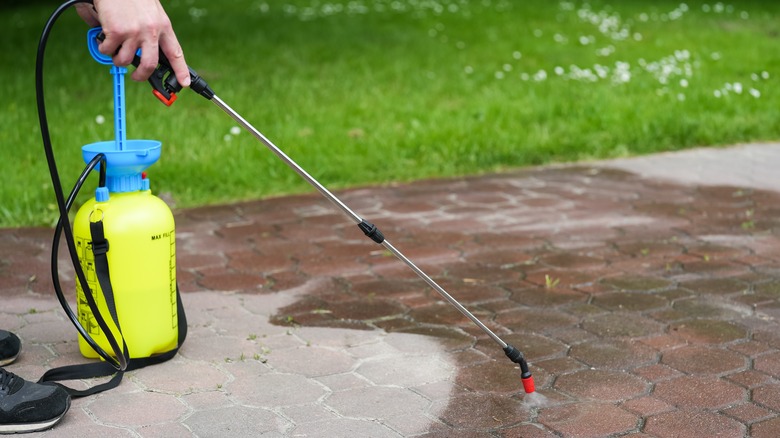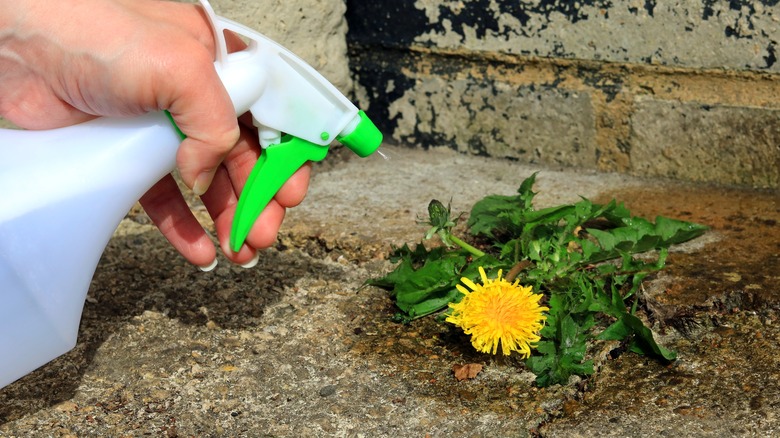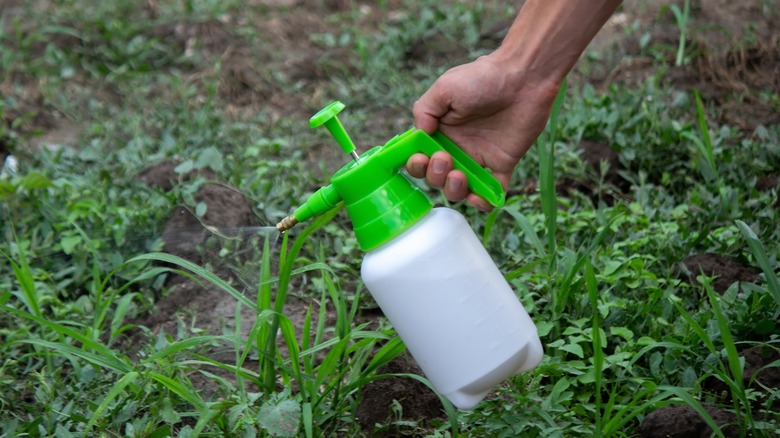Crucial DIY Weed Killer Tips To Know Before You Spray
Weeds and invasive plants are the bane of every garden, lawn, and planter. Some people go the easy way and spray the pesky plants with a commercial weed killer. And that might work until you read the label on the container and find that the weed killer contains glyphosate. Glyphosate is a harmful compound with some serious health side effects. It causes eye and skin irritation, and inhaling or swallowing the spray in large amounts causes nausea and vomiting. Furthermore, exposure to glyphosate puts one at risk of non-Hodgkin lymphoma. You're better off making your own homemade weed killer.
When trying to get rid of weeds in your garden, a DIY weed killer gives you more control over what goes into your spray and what you expose yourself, your household, and your plants to. But that doesn't mean that your homemade concoction is safe to use anytime, anywhere, and in any setting. Moreover, not all the materials you use are as effective as some people might think. At the end of the day, a DIY weed killer is still a plant killer, and there are considerations to weigh and precautions to take before, during, and after applying it. Here are some tips to know before you spray.
What ingredients to use and what to avoid
Vinegar and soap is a popular and quite effective combination home gardeners use to control weeds naturally. Vinegar destroys the leaf and stem tissue of the plants it comes in contact with, works fast, and has a high success rate against annual broadleaf weeds. However, you'll likely be using household vinegar, which is half as strong as horticultural vinegar with acetic acid concentrations under 10%. That's fine for young weeds, but for larger weeds or weeds with taproots, use stronger vinegar, with acetic acid concentrations between 10 and 20%. Be careful, as vinegar kills plants indiscriminately and more acidic vinegars can cause burns and eye irritation.
Another option is tap water. Simply boil water and pour it over a batch of young weeds with shallow roots to kill them. While it has little impact on the environment, boiling water has a limited effect on perennials or weeds with deep roots. You might also add dish soap to your weed control mixture to help the active ingredients stick to the surface of the plants and kill them faster.
Meanwhile, some household ingredients should be avoided as potential weed killers. Borax, while effective, negatively impacts the soil since its main ingredient, boron, doesn't break down quickly. The same goes for table salt, which is so toxic, it can damage the soil structure — and worse, it can move through your soil to other parts of your yard or garden, ruining your plant and grass growth.
Stay safe with your DIY weed killer
As with pests and diseases, it's more prudent to prevent weeds than to try to control them. You can prevent the spread of weeds by mulching, providing adequate watering, and keeping the plants healthy. But when weeds grow out of control and a DIY homemade weed killer becomes essential, then make sure to wear eyeglasses and gloves for protection. Even DIY weed killer can irritate your eyes and skin if given the chance. It's also recommended to test the spray on a small patch to see if it works and whether it has any negative impact on the soil or the healthy plants.
Choosing the right time and conditions to apply the spray can improve weed elimination, too. Avoid spraying on hot days since high temperature reduces the efficacy of the weed killer. Spring and fall are the recommended times for weed management applications. Also avoid windy days since the wind can carry the solution to the healthy plants. As for the weeds, the sooner you treat them, the better. Spray the young plants when they have no more than five leaves. It's easier to kill weeds before they establish in the soil. Keep in mind that more than one application might be required, especially in large infestations. And when treating the invasive plants, try to drench them with the solution thoroughly. Whatever homemade mixture you come up with, you should always research the material you're adding to your DIY weed killer and what effect it could have on the plants and the garden soil.


